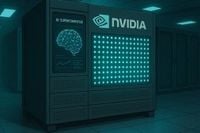Nvidia, the leading AI chip manufacturer, has announced a groundbreaking shift in its production strategy, marking the first time the company will manufacture its AI supercomputers directly in the United States. This significant move comes as the company plans to invest up to $500 billion in AI infrastructure over the next four years, a decision that CEO Jensen Huang claims will enhance the supply chain and better meet the soaring demand for AI technology.
For years, Nvidia has relied heavily on overseas production, particularly in Taiwan, for its chips. However, the geopolitical landscape and trade policies have prompted a reevaluation of this approach. The Trump administration has been vocal about encouraging domestic manufacturing, imposing tariffs on imports from countries like China and Taiwan, which have historically been key suppliers for Nvidia. With a 145% tax on Chinese imports and a 32% tariff on Taiwanese products, the pressure to relocate production has intensified.
In light of these changes, Nvidia's decision to establish production in Phoenix, Arizona, is a strategic move that aligns with the current political climate. The company has already commenced the production of its Blackwell AI chips at facilities operated by Taiwan Semiconductor Manufacturing Company (TSMC) in Arizona. This facility spans over one million square feet and is expected to play a crucial role in Nvidia's production capabilities.
Furthermore, Nvidia's partnerships with Amkor Technology and Siliconware Precision Industries will provide essential packaging and testing services in Arizona. Amkor has recently announced a $2 billion investment to build a packaging facility, further solidifying Arizona's position as a burgeoning hub for semiconductor manufacturing.
Beyond Arizona, Nvidia is also expanding its presence in Texas, where it will collaborate with Foxconn to establish new production facilities around Houston. Additionally, Wistron will operate near Dallas, with both sites set to ramp up production over the next 12 to 15 months. This expansion is not just about traditional manufacturing; Nvidia plans to leverage its expertise in artificial intelligence to create 'digital twin factories.' These innovative facilities will utilize AI to simulate and operate production processes, reflecting a broader trend towards automation in the industry.
The focus on Arizona is not coincidental. The state has become a focal point for significant investments in the tech sector, with TSMC itself planning to invest $100 billion in U.S. manufacturing, including the construction of multiple chip factories. This influx of investment is indicative of a larger trend, as companies recognize the importance of having a stable and resilient supply chain in light of recent global disruptions.
Despite the timing of Nvidia's announcement coinciding with new tariff policies, company leaders have been cautious about directly linking their decision to the current trade environment. However, the implications of these policies cannot be ignored. The push for increased U.S. manufacturing has spurred a wave of investment announcements across the tech industry, with companies like Apple also committing to significant investments in domestic production.
As Nvidia embarks on this ambitious journey, the potential economic impact is substantial. The investment of $500 billion is expected to create hundreds of thousands of jobs, bolstering the U.S. economy and positioning the country as a leader in AI technology. Huang stated, "The engines of the world’s AI infrastructure are being built in the United States for the first time. Adding American manufacturing helps us better meet the incredible and growing demand for AI chips and supercomputers, strengthens our supply chain and boosts our resiliency."
The integration of AI into manufacturing processes also raises important questions about the future of work. A 2017 report by McKinsey & Co. projected that by 2030, up to 800 million workers could lose their jobs due to automation. As Nvidia moves towards more automated production methods, the implications for the workforce will be significant, necessitating a broader discussion about job displacement and retraining initiatives.
In conclusion, Nvidia's commitment to domestic production represents a pivotal moment for the U.S. technology sector. As the company invests heavily in AI infrastructure and embraces innovative manufacturing techniques, it not only responds to current geopolitical pressures but also sets the stage for a more autonomous and resilient future in AI technology. This strategic shift could redefine the landscape of semiconductor manufacturing in the United States, making it a key player in the global tech arena.





